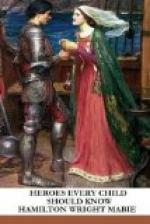CHAPTER XV
WILLIAM TELL
William Tell was born toward the close of the thirteenth century. I cannot tell you the precise year of his birth; but in the year 1307 he was a married man, and lived with his wife and children, in the village of Burglen, near the great town of Altdorf, in the canton of Uri.
Tell maintained his family chiefly by hunting the chamois, and shooting other wild game. So skilful was he in the use of the bow, that the fame of his exploits in that way had obtained for him the name of “The Crossbowman of Burglen.” He was also very skilful in the management of boats upon the lakes. His father had followed the profession of a pilot, and William Tell, though he preferred the life of a hunter, understood the navigation of the lakes better than almost any boatman in the canton of Uri. It was a saying, “That William Tell knew how to handle the rudder as expertly as the bow.” In short, he was a person of strong natural talents, who observed on everything he saw, and acquired all the knowledge he could.
Switzerland was at that time in a state of slavery to Albert, Duke of Austria, who had recently been selected Emperor of Germany. He had taken great offence with the Swiss, because they wished Count Adolph of Nassau to be elected Emperor of Germany instead of him. The first use he made of his power was to punish the Swiss for having favoured the cause of his rival; and he was so unwise as to declare publicly, “that he would no longer treat them as subjects, but as slaves.” In pursuance of this wicked resolution he deprived them of many of their rights and privileges, and altered their ancient laws and customs.
By these proceedings the Emperor rendered his government very unpopular, and when he found that the people expressed dissatisfaction, he built castles and fortresses all over the country, and filled them with soldiers to awe the people into submission. In each of these fortresses he placed a governor, who exercised despotic power in the district over which his sway extended. The inhabitants of the canton Uri, in particular, had to complain of the oppression of their German governor, Gessler, who had committed several murders, and acted in such a manner as to excite general indignation, by his pride, cruelty, and injustice. The whole country was indeed ripe for a revolt, in case an opportunity should occur of throwing off the German yoke.
One cold autumnal evening, the blaze of the cheerful fire which the wife of William Tell had kindled on the hearth, against her husband’s return, gleamed through the rude latticed casements of their cottage window. The earthern floor of the humble dwelling bad been freshly swept; a clean cloth of the matron’s own spinning, was spread on the homely board, which was garnished with wooden bowls and spoons of the most snowy whiteness; and a kettle of fish-soup, with herbs, was stewing over the fire. Some flat oaten cakes, designed to be eaten hot with butter, were baking on the hearth.




